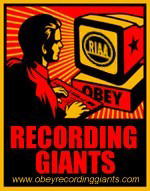
Obey RIAA record earnings. (n.d.) Source: Sachsreport.com
Companies want their products to become infamous, and love when their products become part of culture, only on their own terms. However, societies and cultures do not work in such a fashion. Once an item becomes part of popular culture and becomes embedded into everyday life, it should be expected that consumers will want to share images, quotes, music, and so on. Particularly when that piece of media means something to the individual, will the desire to express themselves by using favorite media as that outlet. Isn’t imitation the sincerest form of flattery? The point being that a monolithic empire such as Star Wars (1977), for instance, is an example of a beast that cannot be stopped. Countless fan films, posted images, and such. Yet the franchise remains strong, because of its continued discussion and sharing among fans to help keep the flame alive.
I agree that the artists who create material by all means should receive credit, and their due worth. I also believe that corporations and conglomerates such as the RIAA and MPAA need to devise a better solution in which to deal with the issues at hand. Suing fans, criminalizing consumers, locking down products with DRM and the like have not only not worked as well as they would like, but have put them in a bad light.
I don’t only blame the media companies; I blame the law too. There needs to be clearer guidelines written into copyright laws with expansion on fair use (for education, social/cultural freedoms, and other non-commercial usages). As Jenkins (2006, p.142) states “…media companies are giving out profoundly mixed signals because they really can’t decide what kind of relationships they want to have with this new kind of consumer.” Jenkins (2006, p.138) quotes Greg McCracken as stating “Corporations must decide whether they are, literally, in or out. Will they make themselves an island or will they enter the mix? Making themselves an island may have certain short-term financial benefits, but the long-term costs can be substantial.” The cost may be already apparent. There are a growing number of web “television” sites that offer original creative content for free, and allow the downloading, and sharing of their shows. They make their money off of advertisements, which they count on being spread. There are bands that are forming their own record labels that allow free downloading, and sharing of their content, and put more focus back onto the artists. Changes are happening.
Jenkins, H. (2006). Convergence culture: Where old and new media collide. New York: New York University Press.
Lucas, G. (Director/Producer), (1977). Star Wars [Motion Picture]. United States. Lucasfilm.
There needs to be clearer guidelines written into copyright laws with expansion on fair use (for education, social/cultural freedoms, and other non-commercial usages).
2 COMMENTS
EL WRAY
Every quote you have cited in this post, I have highlighted in my own copy of Jenkin’s Convergence Culture. Particularly poignant is the listing of all the ways/places marketers want their brand or message displayed. God forbid anyone take the initiative to post something somewhere they didn’t think of first! Marketing is all about endearing a product to the consumer – sending such mixed messages is not the way to do that.
THURSDAY, JULY 16, 2009 – 11:32 AM
ABRAM LLOYD SIEGEL
I particularly agree with your contention that the RIAA and MPAA are way out of hand. DRM in particular really gets to me. Why does all of my music need to be on lockdown? Finally iTunes releases DRM free stuff but lo and behold, I wanted to burn a Michael Jackson Video to DVD and I can’t. You will see this theme recurring over and over on discussion boards all over the internet. I didn’t pay 1.99 to rent your dumb video. I bought it. So what did I do? I went ahead and downloaded the ENTIRE DVD of Michael Jackson videos from a torrent. All I wanted was one video that I thought I owned and I was forced to illegally lift 10 videos that I have never paid for. What the heck is that? Is that really to the industry’s advantage?
SATURDAY, JULY 18, 2009 – 11:41 AM
Filed under: Week 2 |


But if you ask the industry, you didn’t “buy” anything. They licensed you to use it under whatever restrictions you agreed to (which is there justification for sell you a full song for 99 cents and then charge you four bucks to play 15-seconds of it as a ringtone on your phone). It’s a business and they are interested in shaking you down for as much as they can as often as they can. And they are all the better if they can do that and NOT compensate their artists that they care so much about. You don’t own squat.